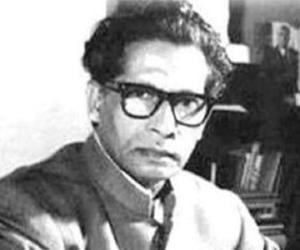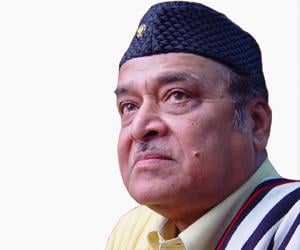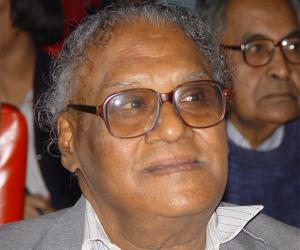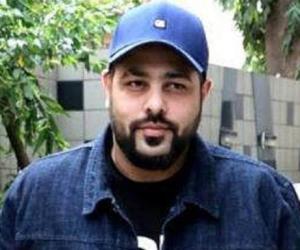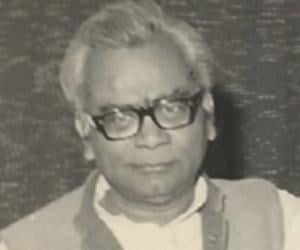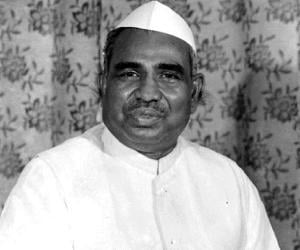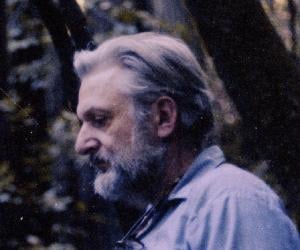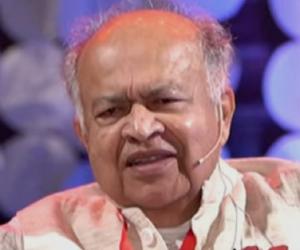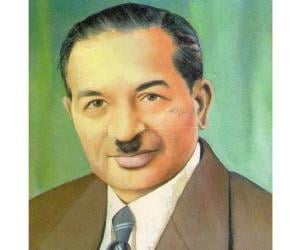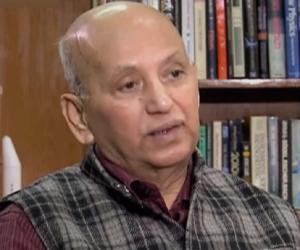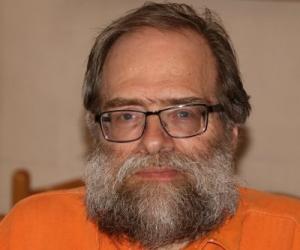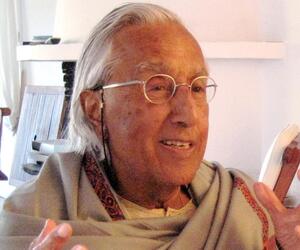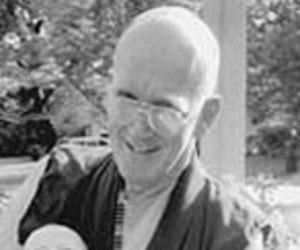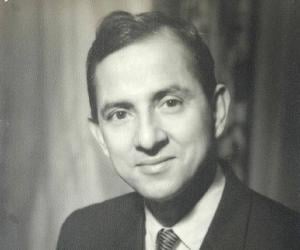Banaras Hindu University
Discover the notable alumni of Banaras Hindu University. The list includes people like Bhupen Hazarika, C. N. R. Rao, Robert M. Pirsig, Shanti Swaroop Bhatnagar & Jayant Narlikar. This list of notable alumni is loosely sorted by popularity and has people from different domains of life, such as writers, scientists, intellectuals & academics, media personalities and film & theater personalities etc.
Vote for Your Favourite Banaras Hindu University
Right IconThis ranking is based on an algorithm that combines various factors, including the votes of our users and search trends on the internet.
1
Harivansh Rai Bachchan
(Indian Poet and Writer of the 'Nayi Kavita Literary Movement' Best Known for His Early Work 'Madhushala')
Birthdate: November 27, 1907
Sun Sign: Sagittarius
Birthplace: Uttar Pradesh, India
Died: January 18, 2003
A pioneer of Hindi romantic poetry and the Chhayavaad movement, Harivanshrai Bachchan is best remembered for his book of 135 quatrains, Madhushala. He was the first Indian to earn a PhD in English literature from Cambridge University. He was also the father of legendary Bollywood star Amitabh Bachchan.
Birthdate: September 8, 1926
Sun Sign: Virgo
Birthplace: Sadiya
Died: November 5, 2011
Bhupen Hazarika was an Indian playback singer, musician, poet, lyricist, and filmmaker. He is remembered for composing such songs that highlight the importance of humanity and universal brotherhood. His songs remain popular in places like Assam and Bangladesh. He is also credited with introducing the folk music of Assam to Bollywood. He was posthumously awarded the Bharat Ratna in 2019.
Birthdate: June 30, 1934
Sun Sign: Cancer
Birthplace: Bangalore, Kingdom of Mysore, British India
C. N. R. Rao already had a PhD degree at age 24 and became the youngest lecturer at the IISc. The Padma Shri- and Padma Vibhushan-winning Indian chemist is best known for his research on areas such as surface chemistry, superconductivity, and nano technology. He is a self-confessed technophobe.
Birthdate: November 19, 1985
Sun Sign: Scorpio
Birthplace: New Delhi, India
Badshah is a singer, rapper, businessman, and film producer. Widely regarded as one of the highest-paid artists in India, Badshah is also considered one of the most controversial Indian rappers. His song Genda Phool is considered controversial, but is yet one of the most successful songs in Indian history. He has been featured thrice in Forbes India's Celebrity 100 list.
5
Ram Manohar Lohia
(Indian Politician and Independence Movement Activist)
Birthdate: March 23, 1910
Sun Sign: Aries
Birthplace: Akbarpur, India
Died: October 12, 1967
Born to an Indian freedom fighter, Ram Manohar Lohia grew up to follow in his father’s footsteps and joined the Indian National Congress to oust the British. He was also associated with Gandhiji’s Quit India movement. He had also co-established the Congress Socialist Party and written extensively on the caste system.
6
Jagjivan Ram
(Indian politician)
Birthdate: April 5, 1908
Sun Sign: Aries
Birthplace: Chandwa, India
Died: July 6, 1986
Birthdate: September 6, 1928
Sun Sign: Virgo
Birthplace: Minneapolis, U.S.
Died: April 24, 2017
8
Jayant Narlikar
(Physicist, Astronomer, Astrophysicist, Scientist, University teacher, Science fiction writer)
Birthdate: July 19, 1938
Sun Sign: Cancer
Birthplace: Kolhapur
Born to a math professor father and a Sanskrit scholar mother, Astrophysicist and IUCAA professor Jayant Narlikar grew up to collaborate with Sir Fred Hoyle, leading to the conformal gravity theory, also known as the Hoyle-Narlikar theory. He has won the Padma Bhushan and Padma Vibhushan and penned sci-fi novels, too.
Birthdate: February 21, 1894
Sun Sign: Pisces
Birthplace: Bhera
Died: January 1, 1955
Known as the father of research laboratories, Indian physical chemist Shanti Swaroop Bhatnagar was a BHU professor. An avid poet, he also penned the kulgeet of the university. He was the first chairman of UGC, headed CSIR, and played a key role in setting up many R&D labs in India.
10
Manoj Tiwari
(Indian Actor and Member of Parliament, Lok Sabha)
Birthdate: February 1, 1971
Sun Sign: Aquarius
Birthplace: Sasaram, Bihar, India
One of Bihar’s greatest superstars, Manoj Tiwari had begun his career as a singer in the temples of Varanasi. The BHU alumnus has sung hits such as Jiya Ho Bihar Ke Lala. He later joined the BJP and became a Lok Sabha MP. He had also been the president of Delhi state BJP.
11
Udupi Ramachandra Rao
(Scientist)
Birthdate: March 10, 1932
Sun Sign: Pisces
Birthplace: Udupi district, Karnataka, India
Died: July 24, 2017
12
Koenraad Elst
(Flemish Right Wing Hindutva Author)
Birthdate: August 7, 1959
Sun Sign: Leo
Birthplace: Leuven
Flemish author Koenraad Elst, who calls himself a “secular humanist,” joined the Banaras Hindu University for his research on Hindu revivalism, after spending his initial years as a hippie. He is known for promoting the Out of India theory, which states the ancient Aryans had originated from the Indian subcontinent.
Birthdate: February 28, 1927
Sun Sign: Pisces
Birthplace: Kot Mohammad Khan, Punjab Province, India
Died: July 27, 2002
14
Raimon Panikkar
(Spanish Roman Catholic Priest)
Birthdate: November 2, 1918
Sun Sign: Scorpio
Birthplace: Barcelona, Spain
Died: August 26, 2010
Born to a Spanish Catholic mother and an Indian Hindu father in Barcelona, Raimon Panikkar grew up to be a Catholic priest and a philosophy professor. An expert in comparative religion, he compared the tenets of Catholicism and Hinduism in his doctoral thesis. He also penned several spiritual texts.
15
Ved Prakash Goyal
(Politician)
Birthdate: 1926 AD
Birthplace: Karnal, Punjab, British India
Died: December 17, 2008
16
Colin Turnbull
(Anthropologist)
Birthdate: November 23, 1924
Sun Sign: Sagittarius
Birthplace: London, United Kingdom
Died: July 28, 1994
British-American anthropologist Colin Turnbull is best remembered for his books The Forest People and The Mountain People. After serving the naval reserves during World War II, he worked as a researcher at the Banaras Hindu University before returning to Oxford. He also taught at the George Washington University.
17
B. P. Koirala
(Prime Minister of Nepal from 1959 to 1960)
Birthdate: September 8, 1914
Sun Sign: Virgo
Birthplace: Varanasi, India
Died: July 21, 1982
B. P. Koirala was a Nepalese political leader, revolutionary, and writer. He is best remembered for his service as the Prime Minister of Nepal from 1959 to 1960. He also served as the Home Minister of Nepal in 1951. B. P. Koirala, who was an ardent advocate of democracy, is often counted among the greatest political figures of Nepal.
18
Rajendra Lahiri
(Revolutionary)
Birthdate: June 29, 1901
Sun Sign: Cancer
Birthplace: Pabna District, Bangladesh
Died: December 17, 1927
19
Kailesh Jagutpal
(Politician)
Birthdate: November 1, 1969
Sun Sign: Scorpio
Birthplace: Grand Bois, Mauritius
